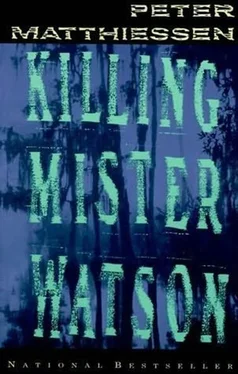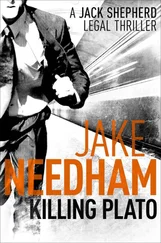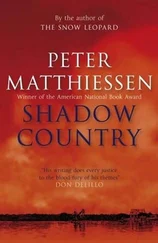Peter Matthiessen - Killing Mister Watson
Здесь есть возможность читать онлайн «Peter Matthiessen - Killing Mister Watson» весь текст электронной книги совершенно бесплатно (целиком полную версию без сокращений). В некоторых случаях можно слушать аудио, скачать через торрент в формате fb2 и присутствует краткое содержание. Жанр: Современная проза, на английском языке. Описание произведения, (предисловие) а так же отзывы посетителей доступны на портале библиотеки ЛибКат.
- Название:Killing Mister Watson
- Автор:
- Жанр:
- Год:неизвестен
- ISBN:нет данных
- Рейтинг книги:4 / 5. Голосов: 1
-
Избранное:Добавить в избранное
- Отзывы:
-
Ваша оценка:
- 80
- 1
- 2
- 3
- 4
- 5
Killing Mister Watson: краткое содержание, описание и аннотация
Предлагаем к чтению аннотацию, описание, краткое содержание или предисловие (зависит от того, что написал сам автор книги «Killing Mister Watson»). Если вы не нашли необходимую информацию о книге — напишите в комментариях, мы постараемся отыскать её.
Killing Mister Watson — читать онлайн бесплатно полную книгу (весь текст) целиком
Ниже представлен текст книги, разбитый по страницам. Система сохранения места последней прочитанной страницы, позволяет с удобством читать онлайн бесплатно книгу «Killing Mister Watson», без необходимости каждый раз заново искать на чём Вы остановились. Поставьте закладку, и сможете в любой момент перейти на страницу, на которой закончили чтение.
Интервал:
Закладка:
"For God's sake, Jane! Be still!"
"'In God We Trust'-we inscribe God on our coins! So even when we torment and burn the poor freed darkies"-Mama speaks more and more softly, intent on her knitting-"we always know that God is on our side."
Mama hums a little to soothe Papa and ease her own frayed nerves. I see her bosom rise and fall. She explains to her children that the dreadful poverty and famine after the War Between the States had shaken our men's confidence that they could provide for their own families on the kind of wages being paid to new black citizens. Perhaps this was why so many of our men feared and punished darkies, who were desperate for a living, too, and were wandering the roads throughout the South.
Papa says nothing. He's no longer reading. I think, Please, Mama! but she says, The men say they punish darkies to protect their women, isn't that it, dear?
Papa stared at her in dreadful warning, but she raised those innocent eyebrows and went on knitting. "A brave woman"-she pretends to address me, as if only females could make sense of the ways of men-"has recently petitioned President McKinley about the lynching of ten thousand Negroes, almost all of them innocent of any crime, and this in the past twenty years alone." And she points her needle at Papa's newspaper, which is lifted high to screen her from his sight. I am terrified by Mama's scary courage.
Papa slaps his paper down. I'll be back, he says, and leaves the room. Mama lets the air cool off a little.
I am startled by Mama's "radical" ideas, but Lucius and Eddie, who are now nine and eleven, want to run to Ireland's Dock and get their papa to buy them candy at Dancy's Stand before he sails off on the Gladiator. The two boys twist like eels upon their chairs, and Lucius pretends he is suffering a call of nature, but Mama doesn't let them off so easily. She tells them poor papa was Lucius's age at the start of the Civil War, and "not much more than Eddie's age," when it was finished. Grandfather Elijah had gone off as a soldier, and Papa had Granny Ellen and Aunt Minnie to take care of, and here he was, still only a young boy! Papa had never once complained, but she'd learned from Granny Ellen that his childhood had been very hard indeed. The family never had enough to eat, and he was deprived of formal education, while "you spoiled boys," Mama said, "have to be begged to do your lessons! And here is poor Papa, in his forties, still trying to learn something about Ancient Greece!" She pointed at Papa's poor old schoolbook, History of Greece, which resided on the table by his chair. She had brought it all the way from Oklahoma.
When Papa is not in the house, our Mama makes no bones about her strong opinions. She is still upset by the Supreme Court, which has upheld segregation on the railroads. "What can more certainly arouse race hate," she reads to us, quoting the dissenting Justice Harlan, "than state enactments which in fact proceed on the ground that colored citizens are so inferior and degraded that they cannot be allowed to sit in public coaches occupied by white citizens?"
Mama says that Indians would also suffer these new "Jim Crow laws" if we hadn't wiped most Indians out with our bullets and diseases. They sure don't count for much in Florida, there's so few left. Papa describes how they come in now to Everglade and Marco with dugouts full of hides and pelts and feathers. They trade for axes, knives, and kettles, candy, coffee, bacon, sewing needles, and even sewing machines. The women make up calico in yellow, red, and black-coral snake colors, Papa noticed. He thinks the coral snake must have secret significance.
It seems the Indians are still scared that the few families left in the Big Cypress will be captured and removed to Oklahoma. They call themselves Mikasuki and not Seminole, but nobody listens to them, least of all Captain Cole, who declares in his clangorous way that he would gladly round up the whole bunch and ship 'em as far as New Orleans in his cattle schooner "at no charge to the government, just to be rid of 'em, because they ain't no different from wolves nor panthers or any other kind of skulking varmint, and sooner or later they are going to be in the way."
Papa says this was the first d--d thing he ever heard Cole say that he agreed with, and also the first that sounded sincere, all except the part about not charging.
MAY 6, 1898. Captain Jim Cole, acting too serious, has brought Mama a book. In a hushed voice, he asked her to read a brief marked section, saying he would return for it a little later. That was the one time, Mama told me, she ever heard Captain Cole speak quietly, as if he imagined one of us had died. That man was always first with the news, she said, turning the book over, bad news especially.
"Hell on the Border!" she exclaimed. "My goodness!" She held it on her lap for a long time before she opened it.
The marked pages told all about Belle Starr, the Outlaw Queen, and her "life of reckless daring" and how that life had ended on her birthday, February 3rd of 1889. Mama sniffed, saying her birthday was actually the day before. She closed the book again. I demanded it, and read aloud: "About fourteen months earlier, a neighbor, one Edgar Watson, had removed from Florida. Mrs. Watson was a woman of unlimited education, highly cultured and possessed of a natural refinement. Set down in the wilderness, surrounded by uneducated people, she was attracted to Belle, as unlike the others, and the two women soon became fast friends. In a moment of confidence she had entrusted Belle with her husband's secret, he had fled from Florida to avoid arrest for murder…" After Belle was murdered, the book said, "suspicion could point to none other than Watson," who was released for want of evidence but was later imprisoned in Arkansas for horse stealing and killed while attempting to escape from an Arkansas prison.
"Well, there you are!" I cried. "That last part proves that this know-it-all has the wrong Watson entirely."
Mama had resumed her knitting, but now her needles stopped. "No, Carrie, honey." She put her work down and took me in her arms.
My heart leapt so I had to press it with my fingertips. At last Mama whispered that the Florida death I was worrying about supposedly involved Rob's uncle. He was a most unpleasant man who had blamed Papa for Rob's mother's death. He lived some way off, in Suwannee County, and she had no idea what happened, the family never spoke about it. One day Papa came home to the farm and told her to pack everything into the wagon, they were going away. He said a shooting had occurred which would be blamed on him, said they'd be coming for him. He never said another word about it.
She held me so tight I could not see her face, I could feel a stiffness in her. Then she let me go and we sat quiet. My heart was pounding, so I knew it wasn't broken.
Even before the war, she said, a man's whole honor might depend on his willingness to fight a duel over almost anything. I knew she was thinking about Papa, our strange dear fierce Scots Highlands hothead, who sometimes drinks too much and gets in trouble, all the more when he imagines that his Edgefield County honor has been slighted. Grandfather Elijah, whom Papa rarely mentions, was also very quick to take offense, and so were many men from Edgefield County, well-born or otherwise, Mama said. When I asked if Papa was well-born, she said, Your Granny Ellen and Great-Aunt Tabitha in Columbia County are educated people, and your father was taught manners, though his education was pitifully neglected.
I asked Mama if she had known Belle Starr, and she said she had. She said that Belle was a generous woman in some ways, not at all stupid, only foolish in her hankering after a romantic Wild West that never was. The Oklahoma Territory was a primitive and violent place where life was rough and cheap, and where whites, Indians, and Negroes-the worst elements of all three races-were mixed up together in an accursed country of mud, loneliness, and terrible tornadoes. Negroes were there early as Indian slaves, and after the war, a lot more blacks had drifted into the Indian Nations where civilization had been left behind. The inhabitants of this wild border country were mostly half-breeds. There was no law and no education, no chivalry, culture, morals, nor good manners, Mama said, and nothing the slightest bit uplifting about any of it. But Belle Starr's father had been a judge back in Missouri, and Belle had a little education, she played the piano fair to middling, and she wanted above all to be a lady. She rented some good bottom land to Papa and asked Mama to tutor her, for her own betterment was the real basis of their friendship.
Читать дальшеИнтервал:
Закладка:
Похожие книги на «Killing Mister Watson»
Представляем Вашему вниманию похожие книги на «Killing Mister Watson» списком для выбора. Мы отобрали схожую по названию и смыслу литературу в надежде предоставить читателям больше вариантов отыскать новые, интересные, ещё непрочитанные произведения.
Обсуждение, отзывы о книге «Killing Mister Watson» и просто собственные мнения читателей. Оставьте ваши комментарии, напишите, что Вы думаете о произведении, его смысле или главных героях. Укажите что конкретно понравилось, а что нет, и почему Вы так считаете.












